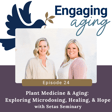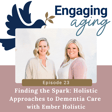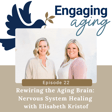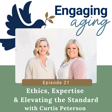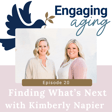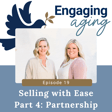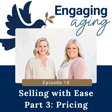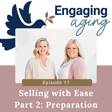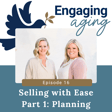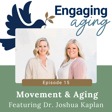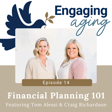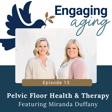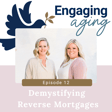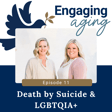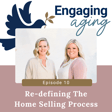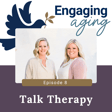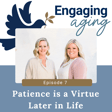Become a Creator today!Start creating today - Share your story with the world!
Start for free
00:00:00
00:00:01

Analysis Paralysis - Information Overload
Too much information is not only overwhelming, but it can oftentimes be debilitating and hinder the process of moving forward. Join Erin and Lauren as they simplify the experience of gaining the pertinent information needed to make the best decision for your unique situation.
Transcript
Introduction and Topic Overview
00:00:01
Speaker
Welcome to Engaging Aging with Erin and Lauren. Join us as we share laughter, tears, and demystify the realities and silver linings that occur later in life. Welcome back. It's Erin and Lauren. Today's episode, we're going to be talking about analysis paralysis. Erin, we always say an informed decision is the best decision, but sometimes we can become so overloaded with information.
00:00:29
Speaker
that we just become so paralyzed by it. Yeah, it's interesting. You would assume that the more information the better when it comes time to making a major life decision.
Challenges of Decision-Making in Aging
00:00:41
Speaker
But it's not always the case. The reason being, you hear me talk a lot about ageism in America, the underlying challenge of why our country
00:00:53
Speaker
In this country, people are in crisis having to make really big decisions with limited information. It's because we don't embrace aging. We don't talk about it. We don't have the resources needed. And there are some people that find themselves in the opposite position.
00:01:09
Speaker
maybe they're proactive. And so they're researching options far before the need. And so you don't know what you don't know. And if you don't know what you need, you'll look at everything and then you get stuck. It's like, have you ever gone to the candle store?
00:01:27
Speaker
You sniff or even the hand lotion and soap store and you sniff a thousand cents and then you're like, hold on, which one did I like? Which one was that? And you're going back to them again and then again and narrowing it down and going back again. It's too much, but then they say sniff like a coffee. I think it's coffee beans or something. It cleanses your nasal palate.
00:01:46
Speaker
This is what we ask our clients to do. Break, stop, take a minute. We should get some coffee beans in the office as an analogy. But take a minute, clear your brain, and we need to start from scratch to see. It's like backwards planning. We've talked about this in a previous episode. If you don't know what your end goal wishes are,
00:02:09
Speaker
And then you can't put a plan together how to get there. So if you don't know what you're looking for, what's most important to you, how to ask the questions of these options, it's a moot point to start calling on them. We recently had an adult daughter client visit us at the office to discuss options.
Client Story: Overwhelmed by Options
00:02:28
Speaker
And when I asked where she's already gone and what she's looked at,
00:02:33
Speaker
I was blown away. She'd been all over the state, all over Eastern Massachusetts. She had been looking at purchase communities, buy-in, continuing care, retirement communities, rental independent living, rental assisted living, and I stopped her halfway through her description and said,
00:02:52
Speaker
What are your parents' needs? Are they involved in the process? What's most important to them? We're putting the cart way in front of the horse by looking at options before gaining clarity on what the needs are. And it was shocking to me that she was surprised by that statement, like no one had said that to her yet in this process. It's interesting because I think a lot of clients that I talk to, or people that I hear from, they think that when you're moving into a community like this,
00:03:21
Speaker
This is just the end, right? You're moving there to die, not necessarily all of the things that these communities can offer.
00:03:29
Speaker
So when I talk to clients and I talk to other people and educate them on what's out there, there's not a one size fits all option. And I always say, and I don't know if it was you or somebody else, picture a speedometer, right? All the way on the left hand side are your very active communities. You don't need a lot of care. And then all the way on the right hand side, I don't know what mileage that goes up to, but
00:03:57
Speaker
are your bridge to a skilled nursing facility and in between is a world of gray. Like you never know until you get very clear on what your needs are, what your wants and desires are for your future to be able to help you find that right community.
Financial Planning and Decision Involvement
00:04:13
Speaker
So what I'm hearing from you is this daughter got caught in a web of you have a need and they just started sending her to places versus taking a minute and really getting clear
00:04:27
Speaker
on how do we start. But here's the bold question for you. I'm curious to know if you asked her, have they even met with a financial planner to know what they can afford based on buy-ins versus monthly rentals?
00:04:43
Speaker
It takes that one step further. Not only have they not met with a financial planner, she's not their decision maker. These are able-minded older adults who she has no idea what their finances are because she's never needed to know. And honestly, I don't know if she needs to know. They are able. So my first question was, are your parents engaged in this process?
00:05:05
Speaker
Are they on board with looking at options? Why are you running around like a chicken with your head cut off, looking at a million places that may not be relevant or even an option for them? She needed to be given the gift. I think the adult daughter, Gilt, seeing changes in her parents and feeling like she needed to be proactive is what was driving her.
00:05:28
Speaker
She needed someone to say, time out. You don't need to be doing all this. Let's engage your parents directly, hear what's important to them, figure out their finances, and then put a path forward. The good news is we did that approach, and it has all fallen into place. But one thing I want to talk about when I think about analysis paralysis, I think about the detriment of a list. So in our industry and elder care, you often hear about, I gave a family a list.
00:05:55
Speaker
A list of five home care agencies or eight local assisted living communities or five movers or whatever. Lists create analysis paralysis. People do not know what they don't know. What do I ask these places? What makes these places different?
00:06:13
Speaker
How should I go about touring them or interviewing them? Lists are not helpful. What's helpful is really getting to know the needs of someone and then making really targeted recommendations to meet those needs. It's like if we walked into a makeup counter and someone started putting red lipstick on us. We'd look pretty damn good. Well, you look good in red lipstick. I don't know. I get nervous.
00:06:38
Speaker
I don't like red. Well, I didn't know that because you didn't ask me. Don't put something on someone that may not fit or people say, I'm sure you've had this question. Well, where do you recommend? Where's your favorite place? There's no meaning what I like, need or want because I hear a lot of is my friend's mom went through the same situation years
Prioritizing Needs in Aging Decisions
00:06:59
Speaker
ago.
00:06:59
Speaker
She went to this community and she hated it or she went to this community and loved it. And that's great, but it's not always going to be the same thing for your mother or your loved one that you're looking for because everybody's wants and desires are so different.
00:07:16
Speaker
So I think analysis paralysis comes through from what society and everybody else is telling us is the right or wrong thing too, when it could be very different experience for someone else. It also, and it derails you. So we all wake up every morning with only so much energy in our reserve.
00:07:37
Speaker
Every single human wakes up with a certain amount of finite energy for the day. Where we're choosing to spend that energy is really impactful and powerful because we're going to burn out. So if I'm spinning my wheels all over the place, energetically looking at options that aren't a good fit, when it comes time to actually executing a plan or really getting things done, I'm burnt out. So get clear first.
00:08:05
Speaker
and then start to put the options and the pieces together from there. So get clear sounds easy to me, right? But it's not. I think let's talk about and spend some time talking about how can somebody get clear? Like what is that first step? Because that to me is incredibly overwhelming. I've had people say to me before,
00:08:29
Speaker
Just take a piece of paper, start writing, get clear. It's like, what is that prompting question to even ask myself to start that process? I think myself is the key word here. If you're an adult child tuning in to hear this today,
00:08:45
Speaker
It truly needs to be about yourself. When we say get clear, we don't want you to get clear about what you think is important to your parents. Get clear about what's important to you. What do you need for yourself in your day to show up as the best version of yourself to your parents? And once you start to do that, then you can be the best support to them, to engage them in conversation in a fun way or the piece of paper and pen
00:09:13
Speaker
Mom, what's most important to you? When you think about the next 5, 10, 15 years, what do you want to see for yourself?
00:09:20
Speaker
Dad, what's most important to you? And by the way, if you have a couple in your life whom you're supporting, be ready for very different answers. We have a lot of clients who are couples. Things get interesting. But each person in the scenario can gain clarity on what they want and then start to put a plan forward. And it's not always going to be safety.
00:09:43
Speaker
You know, it's always interesting. It's very rare, actually, that the older adult tells us that their number one goal or priority is safety, although most people in the senior's life are starting from a point of safety. Of course. So maybe the visiting nurse has come in, or you're meeting with an assisted living, or the adult daughter is worried. Everybody's worried about the older adult's safety.
00:10:09
Speaker
But that's not in alignment with what's most important to them. So when we ask the older adult what's most important to you, maybe it's finding joy again. They haven't had much joy. Maybe it's being social coming out of the isolation of COVID. Whatever that is, validate that for them, that they got clear that social isolation is not for them.
00:10:28
Speaker
So then take that one step further. Tell me more about that. What activities do you miss being with people and doing? I just had a client yesterday talking to me about the choir. She has sung in a choir for like 30 something years and she hasn't in over two years and it's really disheartening
Community Visits and Evaluations
00:10:45
Speaker
for her.
00:10:45
Speaker
So regardless of her ability to be able to still do that, she can still be around an atmosphere where there's singing, there's the ability to do that. We can get her back to require. So transportation has been taken away from her due to her recent physical changes through the pandemic.
00:11:02
Speaker
So we're going to work out transportation so she can get to the choir and sing again. Like that's a really clear, specific, we got clear and we have an action item to help step forward. For her, when looking at maybe a senior living option, I wouldn't even talk about options that don't have quality music programs within the community and the community at large. That's an analysis paralysis of looking at too many options that don't offer the specific need for that individual's
00:11:32
Speaker
you know needs when we have someone who has a progressive diagnosis. Maybe it's a Parkinson's diagnosis. We know that there's going to be a progression of need. We should only be considering options that can meet that need in the future. I think that's actually a beautiful exercise to go through because
00:11:49
Speaker
When you're going through that exercise to find out what's important to you, that choir, or there's Parkinson's disease, and you need a community that can support that, there is a way that you can take that, what you just learned about your mom or your dad, or about yourself, and you can go to a community, and you can ask a question, tell me a little bit about, or tell me a situation where a client came in,
00:12:17
Speaker
that loved being part of a choir. What was that experience like for her? It's allowing them to answer that so that they don't just say a yes or no answer to, yes, we have music. Yes, we have a choir. Build that out for me a little bit more. Like, is that actually an active program that is here at that community? If you do that four or five different times and you're not getting the answers that you need,
00:12:45
Speaker
you know that you don't need to continue that conversation anymore with that community. It's probably in your gut gonna feel like it's not the right place for you to be, and that's okay. I think the analysis paralysis also comes when we're getting hit with all that our community can offer, but we're not getting very granular and focusing in on what's important to that person that's on the other side of us.
00:13:10
Speaker
I think that's a great point. And are you asking the questions of the right person within that community? So if we have a programming question about musical programs in a community, we best be talking to the program director that's managing the programs, not the salesperson. Or sitting through that.
00:13:27
Speaker
Like, we can hear from somebody that, yeah, we have a great music program, but does it live up to what your expectation was? We want to come and participate in that program to make sure it really is part of it. Second to that, sometimes with the people who like analysis, they want to have documents and information, they're coming to the tour with a checklist and making sure that they're crossing all their T's and dotting all their I's and getting all the information.
00:13:51
Speaker
That is analysis paralysis to me right there. They're not present. Are you paying attention to, do people look happy and engaged? Are they well-kept? Does the food taste good? When your head is in a clipboard, so focused on getting your quote unquote information, are you actually able to take it all in and absorb it? I always say the first one or two visits of a community, just be present. If you're putting your toe in the water and it feels good,
00:14:17
Speaker
at the third or fourth or fifth visit, then you can get out the clipboard and ask all the pertinent questions. But just be present. Don't get so caught up in the minutiae of details that you're missing the big picture. Yeah, that makes sense. It makes total sense. And I think a lot of times, too,
00:14:35
Speaker
We can easily forget that it's okay to visit that community multiple times. You don't have to go once and make that decision. Not only is it a huge decision to make. And it's okay to ask multiple questions. It's okay to sit through a music program and then go back again and go back again.
00:14:55
Speaker
then go back for dinner and see what happens at night. We encourage that all of the time. And I think that becomes part of self-advocacy and advocating for somebody else too, which we'll talk about in another episode. But yeah, all the information that is at our fingertips is a lot. And how do we disseminate through that? But then how do we put it into
00:15:22
Speaker
action. And I think it's same with home care. If you're choosing to stay home, you better have a trial run with that home caregiver to make sure it's a good fit, personality wise, ability wise, language wise. You know, we don't take a minute. Like if we're so busy looking at all of these different options, we don't have the time to go deep into any of them. What if we narrow down to one or two and then go granular, then get really deep?
00:15:48
Speaker
versus visiting 12 just to feel like we checked all the boxes. I don't think that's that's ideal. You know, it's coming to my mind, too. I feel sometimes we can become such robots to what we're trying to understand and navigate, right? We're consuming all of the information. But to your point, when we just take a breath and we take a minute, we get very clear.
00:16:15
Speaker
In those moments when we're in those communities or we're interviewing the home care agency, instead of being attached to that clipboard, you're then more in tune to what your gut is telling you. And that's so strong too.
00:16:31
Speaker
to be able to make that decision and know that that's a good decision. And you may have to make some changes along the way, right? We have no crystal ball for what's gonna be the perfect scenario, but you're gonna be smarter and more at ease, I think, with making those decisions because you've done the work beforehand.
00:16:49
Speaker
So maybe that checklist, if you are a checklist type person and you do want a lot of information, which by the way are typically the people who end up in an analysis paralysis, change your checklist. Did I have a good gut feeling versus what's the notice period, for example? Did people seem engaged and happy?
00:17:10
Speaker
You know, if you need that checklist to feel like you're checking all the boxes, make sure they're the pertinent boxes that actually make sense to increasing someone's quality of life. And my curious enough to go back or have another conversation if you're not.
00:17:24
Speaker
I say it's done. You need to meet all the players. You need to go at different times of the day. You need to try the food.
Professional Assistance and Conclusion
00:17:30
Speaker
If you're hiring a home caregiver because you need food cooked for you, you need meal preparation, you best be trying their cooking. I'll tell you right now, that's a big must-have for me later in life. I love to eat and I love to cook. And if someone will be doing that for me, the food better be good. I'll tell you that.
00:17:48
Speaker
I just want to say too as we kind of wrap up this conversation and we could talk about this for a really long time, you don't have to go at trying to navigate these decisions by yourself too. There's a lot of professionals that are out there that have had experiences that can help you get clear on what questions to ask.
00:18:11
Speaker
because it's a lot of information. It's difficult to go through and focus in on what's going to be important to you. Agreed. Agreed. It's a pleasure to be here with you today. I always love these conversations. Thank you.
00:18:27
Speaker
Thank you for joining us today. To continue the conversation, follow us on social media at Dovetail Companies or visit us online at dovetailcompanies.com. And remember, change can be difficult if aging doesn't have to be.


